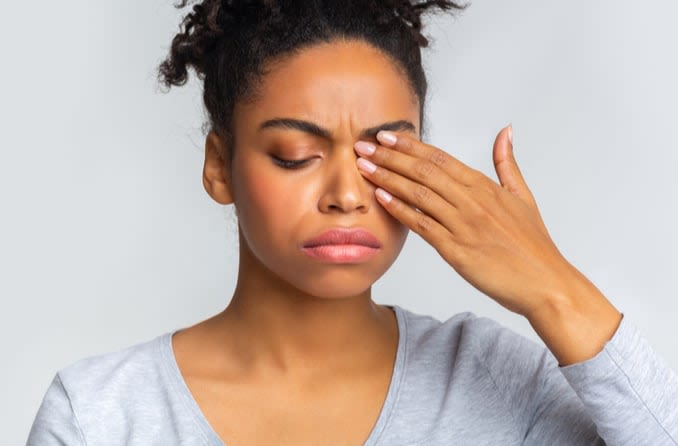Apollo eye infection also known as viral conjunctivitis is a common eye condition that causes redness, itching, and discomfort. It’s called “Apollo” in many parts of Nigeria because the outbreak of this eye infection coincided with the Apollo 11 moon landing in 1969. The name stuck, and to this day, when people experience this infection, they refer to it as “Apollo.”
In this blog post, we will explore the causes, symptoms, treatment, and prevention of Apollo eye infection, using simple language that everyone can understand.
What is Apollo Eye Infection?
Apollo eye infection is a type of conjunctivitis, which is the inflammation of the conjunctiva. The conjunctiva is the thin, transparent layer of tissue that covers the white part of your eye and lines the inside of your eyelids. When this layer becomes inflamed, it leads to redness, swelling, and discomfort in the eye.
This condition is usually caused by a viral infection, but it can also be triggered by bacteria, allergens, or irritants. The viral type is the most common, especially during the rainy season or harmattan, when people are more prone to infections.
Causes of Apollo Eye Infection
The primary cause of Apollo eye infection is a virus, specifically the adenovirus. This virus is highly contagious, meaning it spreads easily from person to person. You can get the virus through direct contact with an infected person, such as shaking hands or touching something they’ve touched, like a doorknob or a towel. It can also spread through the air when someone coughs or sneezes nearby.
Other factors that can cause or contribute to Apollo eye infection include:
- Bacterial Infections: Although less common, bacteria like Staphylococcus and Streptococcus can also cause conjunctivitis.
- Allergens: Pollen, dust, and animal dander can trigger allergic conjunctivitis, which is similar to viral conjunctivitis but not contagious.
- Irritants: Smoke, chlorine in swimming pools, and strong chemicals can irritate the eyes and lead to conjunctivitis.
Symptoms of Apollo
The symptoms of Apollo eye infection can be uncomfortable and annoying. They usually appear suddenly and can affect one or both eyes. Here are the common signs to look out for:
- Redness: The most noticeable symptom is the redness of the eye. This happens because the blood vessels in the conjunctiva become swollen and irritated.
- Itching and Irritation: Your eyes may feel itchy or gritty as if there’s something in them. This can be quite bothersome.
- Tearing: You may notice excessive tearing or watery eyes. This is your body’s way of trying to flush out the infection.
- Discharge: There may be a sticky discharge from the eyes, especially after sleeping. This discharge can make your eyelids stick together.
- Swollen Eyelids: The eyelids may become puffy and swollen, making it difficult to open and close your eyes.
- Sensitivity to Light: Some people experience sensitivity to light (photophobia), which can make being in bright places uncomfortable.
- Blurred Vision: Your vision may become slightly blurred due to the discharge and swelling.
How is Apollo Eye Infection Diagnosed?
If you suspect you have an Apollo eye infection, it’s important to see a healthcare professional for a proper diagnosis. The doctor will examine your eyes and ask about your symptoms. In most cases, a physical examination is enough to diagnose conjunctivitis.
If the doctor suspects a bacterial infection or if the symptoms are severe, they may take a sample of the discharge from your eye for further testing. This helps in identifying the specific cause and deciding on the appropriate treatment.
Treatment of Apollo
Apollo eye infection is usually self-limiting, which means it will go away on its own after a few days to a couple of weeks. However, there are steps you can take to relieve the symptoms and speed up recovery:
- Cold Compress: Applying a cold, damp cloth to your eyes can help reduce swelling and soothe the discomfort.
- Artificial Tears: Over-the-counter eye drops, also known as artificial tears, can help relieve dryness and irritation.
- Avoid Touching Your Eyes: Touching or rubbing your eyes can worsen the infection and spread it to others. Keep your hands away from your face.
- Good Hygiene: Wash your hands frequently, especially after touching your eyes. This helps prevent the spread of the infection to others.
- Antibiotic Eye Drops or Ointment: If the infection is bacterial, the doctor may prescribe antibiotic eye drops or ointment to clear it up. However, antibiotics won’t work for viral infections.
- Avoid Contact Lenses: If you wear contact lenses, it’s best to avoid using them until the infection clears up. Wearing lenses can irritate your eyes further.
In most cases, Apollo eye infection doesn’t require specific antiviral treatment. The body’s immune system will fight off the virus on its own. However, if the infection is severe or doesn’t improve after a week, it’s important to see a doctor for further evaluation.
Preventing Apollo Eye Infection
Prevention is key when it comes to Apollo eye infection, especially since it spreads so easily. Here are some simple tips to protect yourself and others:
- Wash Your Hands Regularly: Clean hands are the best defense against the virus. Wash your hands thoroughly with soap and water, especially after touching your face or eyes.
- Avoid Sharing Personal Items: Do not share towels, pillows, or makeup with others. These items can carry the virus and spread the infection.
- Keep Your Environment Clean: Regularly clean surfaces that are frequently touched, such as doorknobs, countertops, and phones.
- Avoid Close Contact with Infected Individuals: If someone around you has Apollo, try to maintain distance and avoid direct contact until they recover.
- Stay Home if Infected: If you have Apollo, it’s best to stay home and avoid public places until the infection clears up. This helps prevent the spread of the virus to others.
Common Misconceptions About Apollo Eye Infection
There are several myths and misconceptions about Apollo eye infection that can lead to unnecessary fear or ineffective treatments. Let’s clear up a few of these:
- Myth 1: Apollo Eye Infection is Caused by Looking at the Moon: This is a popular myth, but it’s not true. Apollo is caused by a virus, not by looking at the moon.
- Myth 2: Urine Can Cure Apollo: Some people believe that applying urine to the eyes can cure Apollo. This is not only false but also dangerous. Urine can introduce more bacteria into the eye and worsen the infection.
- Myth 3: You Should Cover Your Eyes: Covering your eyes with a patch or bandage can trap bacteria and make the infection worse. It’s better to keep your eyes clean and allow them to breathe.
When to See a Doctor
While most cases of Apollo eye infection are mild and resolve on their own, there are times when you should seek medical attention. You should see a doctor if:
- The symptoms are severe or don’t improve after a week.
- You experience intense pain in your eye.
- You notice changes in your vision, such as blurriness that doesn’t go away.
- There’s a lot of discharge or swelling that affects your ability to open your eyes.
- You have a weakened immune system or an underlying health condition that could make the infection worse.
Conclusion
Apollo eye infection, though uncomfortable, is usually not serious and can be managed with simple home remedies and good hygiene. By understanding the causes, symptoms, and prevention methods, you can protect yourself and others from this common eye condition. If you do get infected, remember that it’s important to take care of your eyes, avoid spreading the virus, and seek medical help if needed.
With proper care and attention, you can get through Apollo and keep your eyes healthy.






